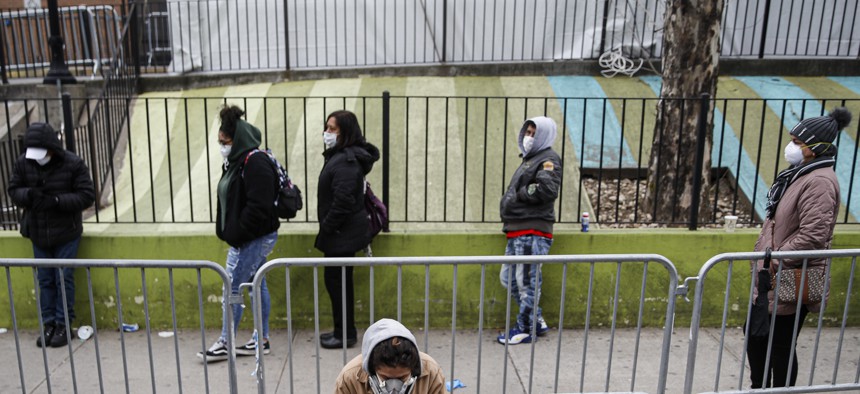Americans Say They Are Taking Social Distancing More Seriously, Poll Shows

People wait outline outside a Covid-19 testing facility in New York. AP Photo/John Minchillo

Connecting state and local government leaders
New polling shows that, on the whole, Americans say they are stepping up efforts to isolate themselves—but some demographics are being more cautious than others.
Americans are describing themselves as taking the social distancing required by the coronavirus pandemic much more seriously than they did even just a couple weeks ago, according to the latest polling from Gallup.
More than 70 percent of adults tracked with the web-based polling over the weekend say they are avoiding public places like restaurants and stores, a jump from the week before, when only a little more than half of those surveyed said they were taking such precautions. Additionally, 68% of people say they are giving up small gatherings with friends and family, up from 46% the prior week.
However, the new numbers of people saying they are complying with government order or requests to stay home come from surveys done on March 20 through 22, which included a weekend where large crowds were seen in spaces like public beaches, state parks and trails, and other outdoor attractions. State and local leaders earlier this week admonished those who weren’t taking social distancing measures seriously enough, calling that type of behavior reckless, arrogant, and selfish.
On Monday, Maryland Gov. Larry Hogan said that those congregating on beaches and in parks were “literally endangering the lives of your family, your friends and your fellow citizens.” But by Wednesday, Hogan said he had seen an improvement, as there were only 14 incidents of gatherings that had to be broken up by law enforcement the previous day. "People are taking it much more seriously," he said.
The vast majority of Americans—over 90%—now say they are avoiding events with large crowds, like concerts, festivals, and sporting events. Many of those types of events are already extremely limited by the dozens of governors and mayors who have enacted bans on mass gatherings, some of which have been classified as including just 10 people.
The percentage of people who have not socially distanced at all is down to 4%, and the percentage of people who have completely isolated themselves from anyone outside their household is up to 20%.
Not all groups are social distancing—the term for staying at home and only leaving for essential needs like grocery shopping—at the same rate. Women are staying away from public places like stores and restaurants more than men, at 74% compared to 69%, the survey found. Residents of the east and west coasts are similarly being slightly more cautious than those in the south. The biggest demographic divide could be seen in people aligned with political parties—80% of Democrats say they are avoiding public places, compared to only 61% of Republicans.
Dr. Anthony Fauci, the director of the National Institute of Allergy and Infectious Diseases, said on Friday that Americans should anticipate continuing social distancing and stay-at-home mandates for at least the next several weeks. “If you look at the trajectory of the curves of outbreaks and other areas … I cannot see that all of a sudden, next week or two weeks from now, it's going to be over,” he said. “I don't think there's a chance of that. I think it's going to be several weeks."
If there were a national stay-at-home mandate for a month—something that President Trump has said he is not considering—people’s willingness to comply has been called into question by Gallup polling. When asked if they’d stay at home if there was a mandate due to a “serious outbreak” of coronavirus in their community, 58% of respondents said they would “very likely” stay at home for a month, up only seven percentage points from the week before. A minority of participants—18%—said it was “somewhat unlikely” or “very unlikely” they would comply.
OTHER STORIES from Route Fifty:

NEXT STORY: Some states are reporting incomplete COVID-19 results, blurring the full picture



